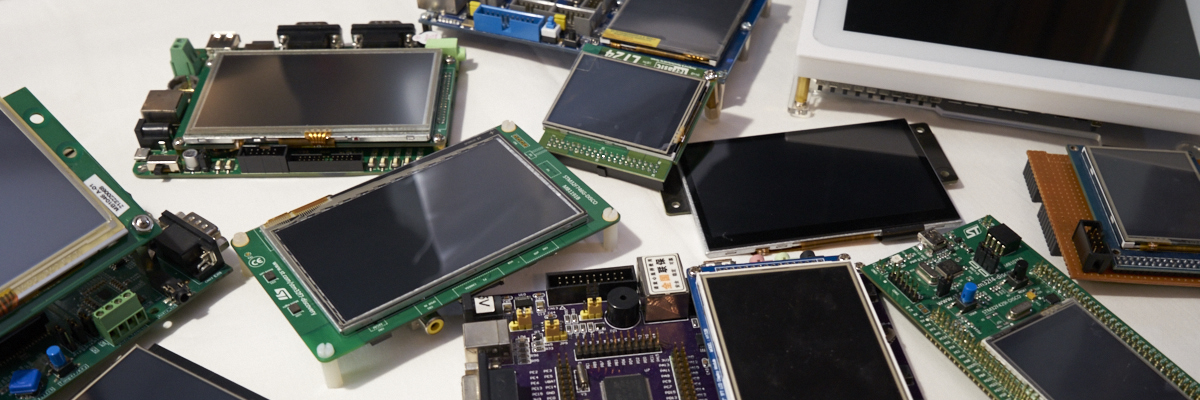-
Posts
2,660 -
Joined
-
Last visited
-
Days Won
2
Content Type
Forums
Store
Downloads
Blogs
Everything posted by Joel Bodenmann
-
It's nice to see that you got uGFX working that quickly. Feel free to ask questions when you stumble upon any issues. ~ Tectu
-

Suggestion: Option to disable rendering
Joel Bodenmann replied to Daid's topic in Development and Feedback
I understand the problem that you are describing. I'll try to come up with a solution asap. ~ Tectu -
Glad to hear that everything is working as it should We'd be happy to add some more projects to our demos page. ~ Tectu
-
The following functions in src/gos/freertos.c need to be modified/implemented to fit your setup (we didn't had time to provide a generic solutions so far): gfxSleepMilliseconds() gfxSleepMicroseconds() MS2ST() Make sure you get the latest repository state before you start working on anything. ~ Tectu
-
I just tried it myself and the font converter does indeed not work as intended. There was a PHP upgrade on our server and this seems to cause some problem. I'll try to fix it ASAP. If you want, you can mail me the font and I'll convert it manually for you until the font converter is up and running again. Please note the required parameters somewhere in that mail. Sorry for the issue. ~ Tectu
-
Hello Florian, There's a branch called freertos in the git repository. In there you will find src/gos/freertos.c and include/gos/freertos.h. These files are included in src/gos/gos.mk and in include/gos/gos.h. This way you can either pick them into your current repository or simply use the branch as it is. The only thing that you should have to modify are the delay functions inside the freertos.c file. Everything else should work as it is there. Just one question: Did you ever run FreeRTOS successfully on your hardware before? Otherwise I would suggest you to start with that. Note that FreeRTOS does not come with any HAL like ChibiOS/RT comes. Therefore you'll have to include your own! Please keep us up to do date ~ Tectu
-
We are currently searching for some volunteers to test our FreeRTOS port... anyone? ~ Tectu
-

Bug: Clipped font drawing goes wrong.
Joel Bodenmann replied to Daid's topic in Development and Feedback
Issue fixed: https://bitbucket.org/Tectu/ugfx/commit ... ?at=master Thanks for reporting. ~ Tectu -

Bug: Clipped font drawing goes wrong.
Joel Bodenmann replied to Daid's topic in Development and Feedback
Thank you very much for the detailed bug report. I'll take a look as soon as possible. ~ Tectu -
Any updates on this? Cannot wait for it as well ~ Tectu
-
Hello Jörg, I am successfully running uGFX on FreeRTOS. This means that the port already exists and runs. It would only require some cleanup to include it into the repository. If you're intetesed, I can send it to you. It would be nice if you could clean it up and contribute it back. It should not take any longer than 30 minutes to complete the job. Please send an e-mail to the adress listed on the website. ~ Tectu
-
I am not sure if you can really use the SPI interface on that board. I'd recommend to use the driver in the ChibiOS/RT repository until you get it working - from there it should only be a matter of changing a few intialization parameters to use the uGFX one. ~ Tectu
-
What exactly did you do? I recommend you to use the provided driver until you get it working. After you got uGFX working, you can use the ILI9341 driver from the uGFX repository. This keeps out problems ~ Tectu
-
I tried the demo from the ChibiOS/RT community repo myself two weeks ago and it worked just fine. From there it should be easy to create a board file. Keep us up to date ~ Tectu
-
Sounds good. Note that you have to use the ChibiOS/RT community repository in order to have the LTDC HAL. It's still the better option to use the git repository as many changes happen to the project. You are always on the latest 'version' that way. It also simplifies the contribution process especially if you change files, rather than adding new ones. If you need any help, let us know. Otherwise adding the works as a .zip here or send it per e-mail will always do the trick. Thank you very much in advance for your work. Please let me know about any progress, I can't await it! :shock: ~ Tectu
-
Hello Thanos, Sadly we didn't find any time to create any board files for that board yet. However, somebody of the ChibiOS/RT community already contributed the LTDC HAL. Therefore it shouln't be too hard for you to wrap the HAL around the GDISP board file interface. If you created the board files, please share them to the community. We would LOVE to officially include the support for the STM32F429i-Discovery board into the repository. ~ Tectu
-

Unable to get ILI9320 display driver working on STM32F
Joel Bodenmann replied to uweng14's topic in Support
Nice to heard that you got your display working! We already had several times the issue with the initialization sequence of the ILI9320 driver. There were already plans to move the initialization to the board file, but as this only happened in a small amount of cases, it seemed to be like killing a fly with a bazooka. Please let me know if you need a different initialization code for the new display again. ~ Tectu -
This may take some time... Please be patient. ~ Tectu
-
I'm seeing several things there that are not the way they are supposed to be (not in any order of importance): What is handle_lcd? Refering to your lcd_init(&handle_lcd); You never call the board_init(). This is the place where you are supposed to set up your pin configuration and other peripherals. You do not reset your display after you called your board_init() (which you currently don't). Even if your LCD does require a non-value based initialisation, it's supposed to be inside gdisp_lld_init(). If you need to set different pins like the enable one, just add those calls to the board file. The driver must be as generic as possible. The command byte to draw a line is supposed to be send through the write_cmd() call in your board file. Please refer to the SSD1306 driver to see how it's supposed to be done properly. In your write_data() routine, you unselect the SPI slave, write to it and then select it. It's supposed to be the other way around. Please refer to the ChibiOS/RT HAL documentation for further information. All of the points above are without looking at your actual algorithms or the datasheet. Please check those points first (most likely they won't solve your issue, but it's hard to debug your code in this "messy" state). I suggest you to take a close look the the existing SSD1306 driver as that one is VERY similar to yours. You shouldn't have to change a lot from there. ~ Tectu
-
Okay, I put it on my ToDo list, but I cannot tell you when I get to it as I am currently in heavy exams trouble. I assume just disable the scroll macro should work out for you in the meantime. ~ Tectu
-

Unable to get ILI9320 display driver working on STM32F
Joel Bodenmann replied to uweng14's topic in Support
Did you have any luck to read out the LCD controllers version number so far? ~ Tectu -
Hello Smd, It will take some time until I can take care of this. Could you please leave some more information in the meantime: Which µGFX version/git master are you using? What is your hardware setup? (board/MCU, display controller) What compiler are you using? (inc. version) ~ Tectu
-

STM32373c-eval evaluation board TFT LCD driving
Joel Bodenmann replied to madokapeng's topic in Support
There are currently no board files for the STM32373C-EVAL board. You have to create them yourself. If the drivers for your screen already exist, it's simply a matter of linking the stuff in the board makefile and create the appropriate board files. Please take a look at one of the many pre-made ones you can find in /boards/base. Otherwise you first have to create your display driver. At least the initialisation routine can be taken from the STM demo code. Feel free to ask when you face any problems. Most people get their drivers work in one or two days. However, proper C skills are required, of course. But as you are dealing with that kind of board, that shouldn't be any problem. ~ Tectu -

Want to do lazy display output computation (printf... )
Joel Bodenmann replied to goeck's topic in Support
Note that you can also change the GDISP worker thread priority in your gfxconf.h. ~ Tectu -

STM32373c-eval evaluation board TFT LCD driving
Joel Bodenmann replied to madokapeng's topic in Support
Hello madokapeng and welcome to the µGFX community! What you want is the 2.0 release of µGFX (ugfx-release-20.zip). ChibiOS/GFX was the previous name of the project and hence the 1.7 release was before the current 2.0. However, it's recommended to use the git repository master, as there are lots of bug fixes happening after each new release. The 2.0 is a bit unstable as every .0 release is (classing software designer issue). If you take a look at the git history, you can clearly see that there are a lot of bug fixes since the release. ~ Tectu

